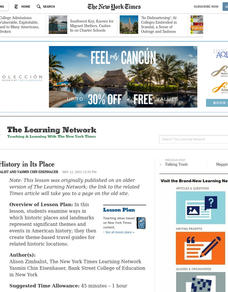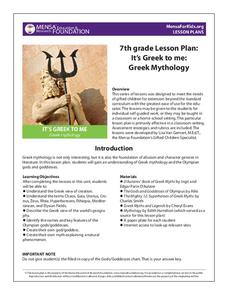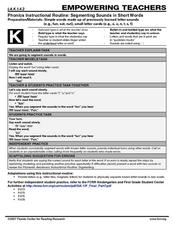Curated OER
Putting History in its Place
Examine ways in which historic places and landmarks represent significant themes and events in American history. Then create theme-based travel guides for related historic locations. This lesson requires informational reference materials...
MENSA Education & Research Foundation
It’s Greek to Me: Greek Mythology
It's no myth: this packet on Greek mythology is an excellent addition to your social studies curriculum. With writing activities, such as short answer responses and biopoems, and reading activities, which include creation stories and...
Facing History and Ourselves
Confirmation and Other Biases
As the investigation into the reporting of the events in Ferguson, Missouri, continues, class members consider how bias influences perception, how the tendency is to collect evidence that supports preconceived notions. The big idea...
Gateways
Teaching the Easter Story
If you are looking for a secular approach to teaching about Easter, this may just be the resource for you. Pupils read a paraphrased text depicting the last supper, arrest, and crucifixion of Jesus Christ as told in the Bible, while also...
Curated OER
Phineas Gage: Notecard Vocabulary Strategy
Understanding the vocabulary in a text, especially a text like Phineas Gage: A Gruesome but True Story About Brain Science that includes quite a few technical terms, can be the key to understanding the text as a whole. Learners focus on...
Curated OER
Identify Base Words and Suffixes to Read Multisyllabic Words #1
Show your scholars how adding an affix changes the entire meaning of a word; they focus on the suffix -able. You'll find a complete script here, but if you don't want to read this verbatim, use it simply as an outline. Learners watch you...
Geography 360°
Poetry Writing
Put the tips and tricks in this guide into practice in order to encourage your pupils to blossom into poets. A wonderful reference material for teachers, this packet includes definitions of poetic terms and forms as well as step-by-step...
CC Homestead
Summarize
Designed for third graders but appropriate for older learners as well, this packet of materials underscores the necessity of teaching kids how to summarize, how to identify main ideas and supporting details, and how to ask questions...
Crafting Freedom
Harriet Jabocs and Elizabeth Keckly: The Material and Emotional Realities of Childhood in Slavery
Learning how to make accurate inferences by putting together facts found in multiple sources is one of those skills all learners must develop, but one that can be a challenge to teach. This resource is a must-have for your curriculum...
Crafting Freedom
Harriet Jabocs and Elizabeth Keckly: The Material and Emotional Realities of Childhood in Slavery
Through the journals written by Harriet Jacobs and Elizabeth Keckly, young readers gain insight into the lives of two enslaved children on nineteenth-century plantations.
Curated OER
Read to Feed
Students participate in the Read-to-Feed project. In this fundraising lesson, students read books to purchase a farm animal for a family in need. Students write a letter to the family that will be receiving the farm animal.
Novelinks
Where the Red Fern Grows: Graphic Organizer, Story Map
How do you grow a goal from a dream to reality? You make a plan! After reading chapters two and three of Where the Red Fern Grows, learners map how Billy earns his dogs by completing an organizer in pairs and then discussing answers in...
EngageNY
Read Expressions in Which Letters Stand for Numbers
Pencil in the resource on writing verbal phrases into your lesson plans. The 15th installment of a 36-part module has scholars write verbal phases for algebraic expressions. They complete a set of problems to solidify this skill.
Novelinks
Zach’s Lie: The K-W-H-L Strategy
The attached resource is no lie! The K-W-H-L activity, which is fourth in a series of seven, serves as a pre- and post-assessment. First, pupils brainstorm what they know about a specific topic, then they list what they want to know, how...
Curated OER
Speedy Gonzales Reading
Students demonstrate their fluency through repeated readings. They review what a fluent reader is and practice decoding through cross-checking and covering unknown words. They work in pairs to read a passage several times and record...
Curated OER
Introduce Vocabulary: I Hate To Be Sick
Engaged in a read aloud, kids use the story to define new vocabulary words, raising their hands when they hear new words in the story. Additionally, individuals refer to the text to show how the word was used in context. Vocabulary words...
Curated OER
Synthesis of Information
Locating and synthesizing information is an essential part of the research process but can be overwhelming for many young writers. Eliminate some of the stress and confusion, this resource suggests, by separating these steps. To focus...
Curated OER
Phonics: Segmenting Sounds in Short Words
F-u-n spells fun. It is a simple word that little learners can sound out as they build phonemic awareness and those early reading skills. This short scripted lesson provides teachers with the basics for teaching how to sound out words.
Baruch College Writing Center
Summarizing, Paraphrasing, and Quoting Workshop
What's the difference between summarizing and paraphrasing? Show class members how to find the main ideas from informational text and condense it, restate it, or quote it directly with a series of educational activities based on two...
Pearson Longman
Back Talk: A Summarizing Activity
Here's resource that presents step-by-step directions for three different activities that ask kids to read a short passage, listen for the main points, and then to summarize the passage in their own words.
Curated OER
EU and Turkey
Should Turkey be admitted to the European Union? Before debating this question, class members research the background and stated purpose of the EU, read articles of Turkey's bid to become a member of the EU, and the concerns other...
Howard Hughes Medical Institute
Lesson 2: Gorongosa National Park
How has Gorongosa National Park changed over time? Discover the park's rich history, dating back to primitive human times, through an interactive timeline and scientific reading. The second installment in an eight-part series explores...
Center for Civic Education
The Power of Nonviolence: The Children's March
What was the Children's Crusade and how did it impact the civil rights movement in the United States? Your young learners will learn about this incredible event through a variety of instructional activities, from reading a poem and...
EngageNY
TASC Transition Curriculum: Workshop 12
How can opinions slant facts? Workshop participants learn how to examine primary and secondary sources and identify the author's point of view. They also examine how visual art impacts the meaning and rhetoric of sources. Full of...

























